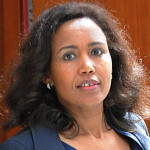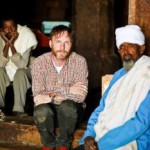 It is acknowledged that Ethiopia with eighty plus ethnic and multinational diversities, today more than ever, is experiencing interdependencies like never before; to tackle the myriad of challenges both national and global nature; ranging from; health crisis; such as the spread of HIV infections and malaria. Threats from global health crisis like the swine flu and the current universal debate on climate change. The biggest threat to our national security is the threat of terrorism; both home grown and those that come from outside of our borders. We need to be vigilant and interdependent. And we need to stop it before it happens and also we have to be one hundred percent successful.
It is acknowledged that Ethiopia with eighty plus ethnic and multinational diversities, today more than ever, is experiencing interdependencies like never before; to tackle the myriad of challenges both national and global nature; ranging from; health crisis; such as the spread of HIV infections and malaria. Threats from global health crisis like the swine flu and the current universal debate on climate change. The biggest threat to our national security is the threat of terrorism; both home grown and those that come from outside of our borders. We need to be vigilant and interdependent. And we need to stop it before it happens and also we have to be one hundred percent successful.
Our economic interdependencies range from sharing natural resources to interstate financial transactions. These interdependencies have not in any physical sense obliterated interstate borders, or replaced ethnic cultural heritages and interests and sentiments. Nevertheless, these interdependencies have made it difficult for states to stand alone, even in times of prosperity. This co-dependence among states has made it increasingly apparent that only through alliances and cooperation with one another can Ethiopia with multitude ethnic nation-states maintain prosperity and engage in further growth and development. The old adage is: we swim together or sink together.
What I find mind boggling and continuously worrisome, however, is the seemingly blind and redundant emphasis on a parochial form of nationalism. This has come from a vocal few often contradicting it-self and is often self-defeatist.
Ethiopia, no matter how much the government continues to sugar coat it with slogans and political rallies, has been and continues to be faced by a debilitating disjointedness in terms of institutional structures and governance that can facilitate alliances and cooperation for the betterment of the peoples. I’m not making up this, one simply has to drive through the Oromo regions; from Kilele to Woreda and Kebele and test how Federal laws or federal government policy directives are interpreted and implemented, and it’s all lost on translation.
The diversity in Ethiopian multi-ethnic cultures, economies and other areas is not a cause for or justification potential risk for disunity and incoherence that is evident. Instead, it is a lack of vision of the government of the prior leadership and political will on the part of our current leaders, who think holding onto power, is more important than ensuring long-term sustainability.
Recent event (Teddy Afro VS the Oromos) seemingly petty but definitely a tell-tell sign to the simmering tensions among the various ethnic communities. Teddy Afro has all the right to express himself based on his perception or knowledge of Menilik’s rein -.the danger is if a group can successfully derail someone’s career simply because their version of the historical facts of the emperor are deferent, then we are entering into an era of political blackmailing and intolerance and could easily spread among all facets of the socio-political spectrum of Ethiopia’s numerous ethnic communities.
P.S. Maybe recent article about the emperor has vindicated Teddy Afro.
To foster and enhance a culture of interdependency I suggest a two pronged plan of action:
1) Ethiopian Peoples Initiative: People Initiative is time tested universally accepted scheme whereby citizens peacefully organize to; recommend, amend, delete or add to a legislative agenda. In other words this is a referendum advanced by the people instead of the government.
2) This is what governments do daily, cranking out laws through the legislative process. This is faster and less painful. This process is used to go back and fix the mess governments create on the first go. They do it with a stroke of a pen.
Questions around what Ethiopia needs to do to get itself out of the current political rut and foster inter dependency and make people feel that we are all in this together requires bold directional change. If we are to believe people like Seye Abraha former head honcho of TPLF who has now publicly admitted to us of the political botches caused during the formation of Ethnic Federalism form of government, hopefully we an convince current EPRDF leadership to revisit these issues. Proposed remedies to be: the establishment of a single national operational language and the realignment of the current gerrymandered interstate boundaries. By the way these constitutional policy decisions with lasting implications should have gone through rigorous public debate before it was enacted into law. After all every Ethiopian living in every croon and crannies of this vast land have a vested interest in each other.
These 80 plus Ethiopia’s Ethnic communities have enriched each and every one of us with their unique arts and crafts, music and dances, clothing and jewelries and finally their languages. Ethnic based Federalism will guarantee the preservation of these cultural treasures for generations to come.
Wise and visionary leader under similar circumstances who understood the beauty of Tanzania’s diverse ethnic communities also acknowledged that it requires a single element as a binding device to keep the republic intact. This great leader wrote into the constitution that Swahili will be the administrative and operational language of the nation and at the same time building mechanisms whereby ethnic languages and cultures are protected and encouraged at a local level, what a genius.
Julius Neyrere a giant among African leaders not only kept Tanzania united also incorporated an island state called Zanzibar and changed the name Tanganyika to today’s Tanzania. This country is an island of tranquility, stability, and a peaceful nation in an area beset by tribal conflict; wars and blood shade. Countries like Rwanda, Burundi, Congo and even neighboring Kenya to name a few where people are massacred in millions and the bloodshed still continues.
In the case of Ethiopia; the issue of language is also an economic imperative; the facilitation of information highway and Internet usage, teleconferencing, email and texting. Federal government officials real time communications with their counterpart at Killel, Woreda and Kebele level. Technology fosters transparency and helps reduce beaurocratic red tape; a breeding ground for the rampant corruption that is bedeviling the country. It’s time for a business man from Addis or anywhere else in the country to be able to conduct business transactions with his counterpart in Afar or Oromo region.
There are proponents of the current policy. I had an email exchanges with one Oromo college professor (by the way if you come across a college professor turned politician –RUN. Most of them are mumbling idiots, 15 min on the lime light). The arguments in favor of the status quo range: as a way of settling score for alleged past grievances to the one that follows government’s talking points: that; South Africa, India and Switzerland have successfully adopted similar policies. The problem with that argument is that for all practical purposes India and South Africa have abandoned the failing policy and the lingua franca is now English and that leaves Switzerland.
Switzerland; Highly developed European country with three language states (French, Italian and German) with Anglo-Saxon Latin roots.
Ethiopia; African country with multi ethnic society; with estimates ranging 80 to over 100 languages and a developing country, go figure. No comparison, end of discussion, case closed. I hope nobody ever brings this again as a justification, specially the Ethiopian government.
Recent study in South Africa (with 11 ethnic languages) the language debacle shows an annual economic cost of 3-5% to their GDP. This language issue is a shackle to our economic growth and prosperity and unity and it’s time to reverse this insanity.
The second issue of interstate border demarcation is a minor cause for anxiety as compared to the issue of language with serious long term implications.
In this case I can only surmise that this is a politically motivated policy blunder; because none of these lines the way they crisscross the country have any rhythm or rhyme. Again, I’m not making this up; one simply has to drive north on interstate highway; Addis to Mekele. Every twenty five miles I’ve crossed from Oromia region to Amhara region until you cross in to Wello province. What an administrative night mare these people are subjected to for no apparent reason and no fault of theirs.
Today, narrow nationalism is a route to fundamental disaster. The emphasis should be our national ‘boundedness’ not drawing individual ethnic boundaries and in the process create a multitude of fiefdoms. They just need to now be measured in a world in which narrow definitions of ethnicity are harmful and a threat to our unity and interdependency. It is ironic that, the elites inside EPRDF were at the forefront of berating the legacies of previous governments for being divisive and hegemonic; today they are committing the same mistake by continuing to rein over a flowed policy. Indeed, some have argued that the whole rhetoric and effects of these ‘nation/state’ interdependencies have led to an emphasis on local cultures, political practices, and an attempt to emphasis their ethnicity. A well-crafted constitutional policy with a broader definition and practice of nationhood will enhance these sentiments and will reinforce the culture of interdependency.
We, the older generation, are accused of not understanding the basis of our more recent history, the struggles and sacrifices of the last 30 years. To my knowledge, my generations struggles were never individualistic. Instead, they were guided by communal philosophies and demanded alliances across the nation for a common good. Today, we want to claim that tradition but we are told it is ‘interference’ in ethnic communities’ affairs, that individuals override even those interests that are national.
For Ethiopia, charity obviously has to begin at home. I don’t believe in finger pointing or retribution. To continue to dwell in the past is not healthy and is unproductive. I’m futuristic our legacy should always be to leave a healthy and well informed (educated) generation. And more united country. Whatever version of democracy we call it, we need one, but we need to continue to perfect it. There may be fundamental ideological differences, exploitative relations that cannot be denied and historical imbalances that need to be addressed, however, we cannot wish away the interconnectedness and interdependencies. We need to work on them in ways that can benefit us, and no one man/woman has the formula for such strategies and calculations.
Finally, I’m not here to accuse past or present governments, as a matter of fact I’ve always believed in constructive engagement. I’ve written several articles against haters. And against those who make frivolous accusations. I’ve always admired the breathtaking economic achievements in the last 10/15 years. I’ve visited the Tekeze dam, an amazing engineering accomplishment, roads and irrigation systems done by a coherent well-articulated economic system. Foreign policy success second to none.
No policy is a sacred cow; these two policies specially are harming the country, they have outlasted their political benefits. I hope you don’t dismiss it as one of those disgruntled member of the diaspora.
By Demissew Gedamu




























Join Conversations